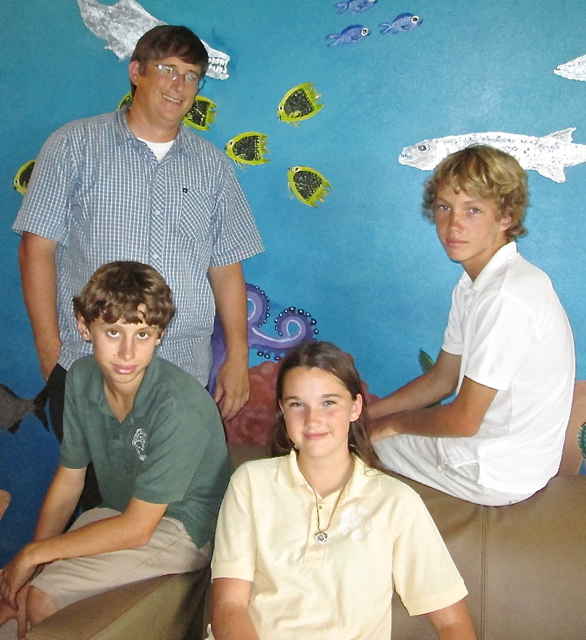
“They say when you start to take them out, it makes a difference,” Evan Jones, 14, said of the lionfish.
Skye Ehrhart, 13, said that after the first day of lionfish spotting, he knew there was a purpose to their efforts.
It is a big help, the adults said.
“Young eyes are really good eyes. The lionfish I got that day, the kids had seen them,” CORE member Frank Cummings said.
He went out on a lionfish mission with the Gifft Hill students in April.
The Gifft Hill School Junior CORE program has its roots in a learn-to-dive workshop that was held last year as part of the school’s week-long extracurricular activity, called minimester. The dive program happened thanks to a $500 grant from V.I. National Park, said science teacher Chris Dunlap, who supervises the Junior CORE program.
Dunlap said the minimester’s purpose is to give the students life experiences that will help them make a difference in the community.
The students who became certified divers learned of the lionfish problem when they went scuba diving. When the next minimester came along, the Junior CORE program fit right in.
“It’s hard if you don’t have a scuba tank,” Missy Muilenburg, 13, said of efforts to spot the fish.
Dunlap stressed that the students are only serving as lionfish locators. They leave the actual spearing of the fish to the CORE members certified to kill them.
Even spotting lionfish comes with challenges.
“It was pouring for minimester and the water was cold,” Missy said.
Accessibility is another issue, but Dunlap said in areas the students are able to reach the number of lionfish spotted has dropped considerably.
“The challenge is the offshore reefs,” Dunlap said.
Jones said that when they first visited an area, they saw about 15 lionfish on one day, with Dunlap adding that they spotted about four day in one particular spot on the island’s south side. Three or four months later, there were only one or two per day at the same south side location.
The students also expect to be peer educators, letting fellow students at all St. John’s schools know about the problems caused by lionfish. The invasive species first showed up in the Virgin Islands when one was captured off St. Croix on Nov. 25, 2008. The first one appeared on St. John in 2009.
While the lionfish are native to the Indo-Pacific region, Cummings said earlier that they found their way to the Atlantic Ocean and subsequently to the Caribbean when 1992’s Hurricane Andrew destroyed aquariums containing eight breeders at a private beach in South Florida. Subsequently, aquarium owners dumped them into the ocean, particularly after they got stung while cleaning the tanks.
The lionfish made their way as far north as Cape Cod,, Mass., before heading south. Cummings said St. Croix saw the first of the lionfish invasion because the current is closer to that island than St. Thomas and St. John.
Lionfish devour the reef fish that eat the algae that grows on the reef. If the reef fish are not around to consume the algae, the algae will grow and smother the reef.
Those involved with the problem fear this will have a big impact on the territory’s tourism-based economy since many people visit to enjoy the water.
“After a presentation, I realized how much a problem it would be for the tourism industry,” Skye said.
Gifft Hill head of school Judy Chamberlain said she was proud of the students.
“The Gifft Hill School Lionfish hunters are passionate about and relentless in their work to rid this invasive, non-native species and restore balance to the Caribbean eco-system. They are heroes to all of us,” Chamberlain said.
While the students are working hard to help CORE volunteers capture the lionfish, it’s a labor of love.
“I’ll do just about anything to get to the beach and be in the water,” Skye said.





